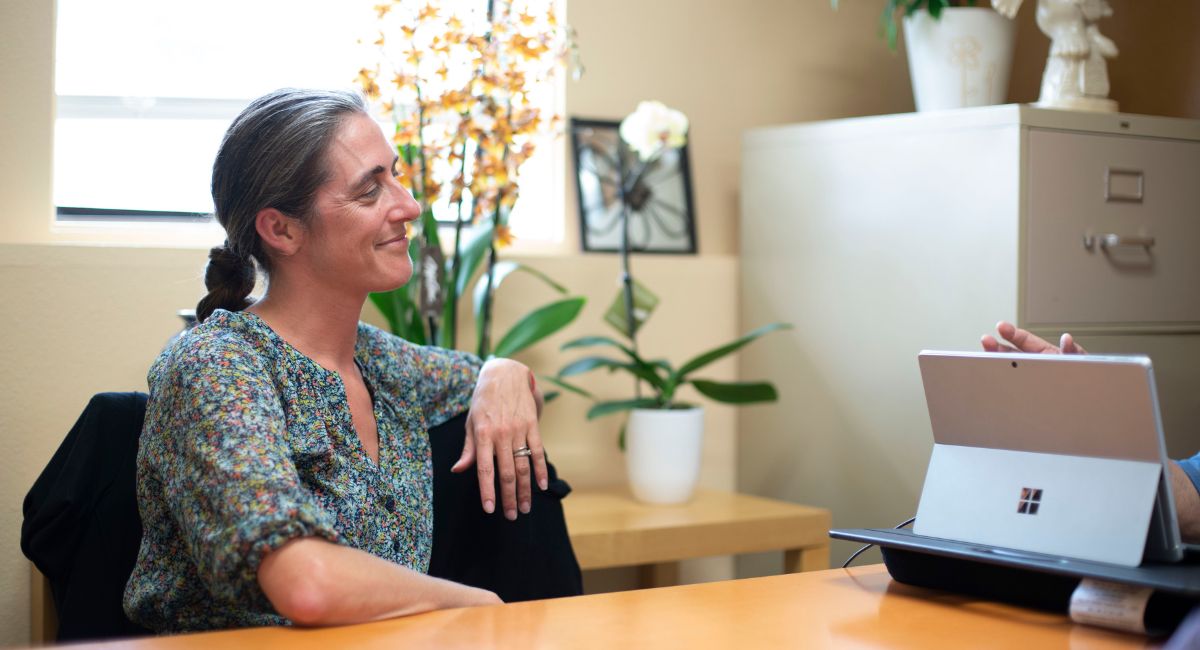
Lesley Steinman in a meeting with her colleagues at the Health Promotion Research Center (Photo by Elizar Mercado)
Twenty years ago, Lesley Steinman and her colleagues at the University of Washington Health Promotion Research Center were given a task: turn a wildly successful new intervention that was proven to help older adults with depression into a wide reaching program.
The intervention was called The Program to Encourage Active, Rewarding Lives, or PEARLS. It was housed in the CDC-funded Health Promotion Research Center (HPRC), where Steinman had joined as a research assistant to fund her master’s in public health and social work at the UW. Steinman didn’t know anything about aging or mental health when she joined the team. But 20 years later, Steinman is still at HPRC, has just completed her doctorate in health services from the UW School of Public Health, and has helped the HPRC team and its partners research and spread PEARLS’ mental health impact to over 12,000 aging adults across the country.
“I give a lot of credit to our community for PEARLS being where it is today in terms of growing and reaching so many people’s lives,” Steinman said. “It’s a community laboratory, and they come to us with smart adaptations of the model so it’s relevant, accessible, culturally appropriate and in partnership with systems and organizations that serve these adults.”
For her academic excellence and commitment to public health, Steinman is the recipient of the 2023 Gilbert S. Omenn Award for Academic Excellence, one of the most prestigious awards for master’s and doctoral students at the School of Public Health. While a long time staff member of the UW, Steinman said she chose to get her doctorate in service of her community.
“Across all her public health research and practice, Lesley is committed to evidence-based practice, finding paths toward sustainability, and serving those most underserved by our current systems,” said Peggy Hannon, professor and director of HPRC who has worked alongside Steinman for 20 years. “She is deeply engaged in reshaping public health to become anti-racist and anti-oppressive and applies this engagement to her research and to UW and HPRC.”
A pearl of older adult mental health care
The PEARLS program can save lives.
Steinman hears this feedback on calls with PEARLS coaches who deliver mental health support to the older adults PEARLS serves. Just as importantly, she hears stories of how adults who at one time felt like a prisoner in their own homes are now connected to a wide network of community support.
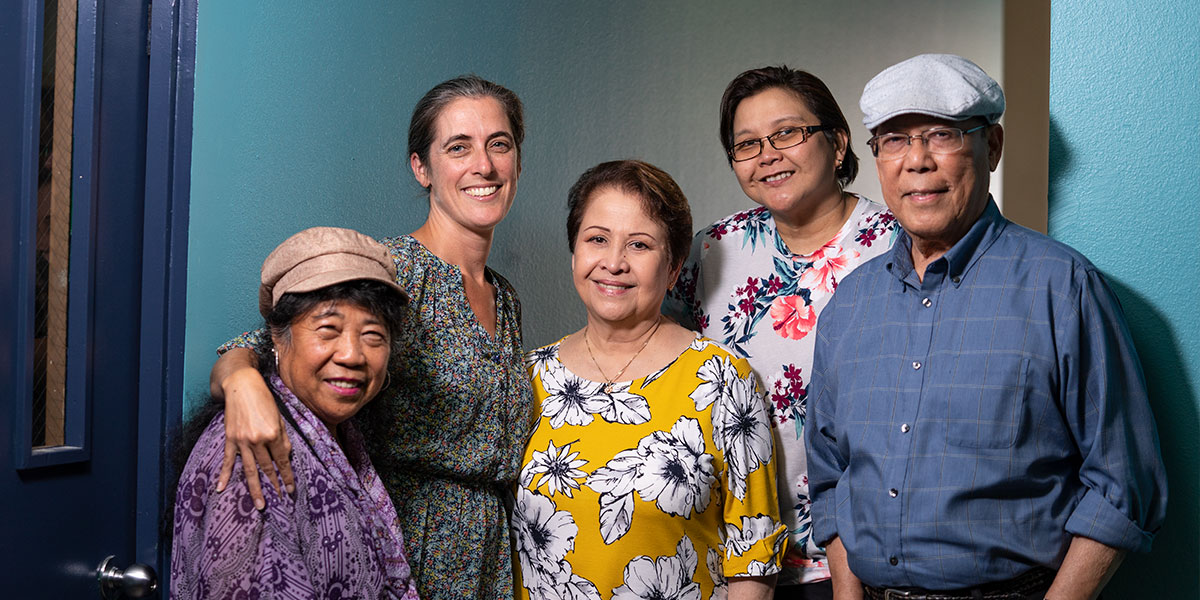
(From left to right) Vilma Carver, Lesley Steinman, Marivic Rigor, Mari-Len Tayao, and Conrado "Sluggo" Rigor at the International Drop-In Center. (Photo credit Elizar Mercado)
“This is the time they deserve to have their healthiest, happiest moments and quite frankly, that is often not the case, due to ageism, racism, sexism, and other inequities that older adults face,” Steinman said. “Some people struggling with depression talk about not wanting to be here, and suicide is preventable. It is a call for help that things have become untenable in their life.”
The PEARLS program trains trusted community members to be coaches for those with mental health symptoms. Participants of PEARLS don’t need a diagnosis, and coaches don’t require a mental health license. But with training, coaches provide skills and behavioral interventions to help address depression and anxiety among older adults and connect them with other community members and services.
Cultural humility is critical to this work, Steinman said. Many older adults have a stigma around mental health, so using familiar non-clinical language, connecting people with coaches who speak their own language, and having a trusted face from within the community matters to connect people to care.
“There is now shared recognition that there’s never going to be enough clinicians and there doesn't have to be,” Steinman said. “How do we build the capacity of people who are in the community, whether it’s community health workers or peers, to promote mental health, and not just address depression, anxiety, and stress, but promote mental health and wellness before these conditions develop?”
HPRC, housed in the Department of Health Systems and Population Health in the School of Public Health, co-developed PEARLS during the late 1990s with Aging and Disability Services in Seattle and King County. In 2004, researchers found PEARLS participants were three times more likely to reduce their depressive symptoms by 50% or no longer have symptoms of clinical depression, as compared to participants who didn’t receive treatment or who had therapy or medication for mental health.
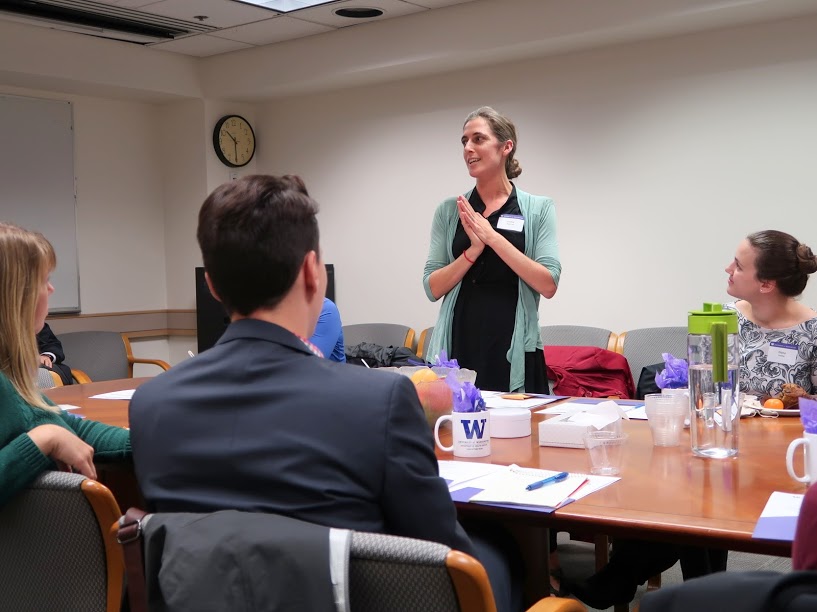
With such a successful program, the important task of spreading reach was designated to the staff at HPRC. Steinman and her mentor Dr. Mark Snowden started holding monthly calls with community-based organizations in different areas of the country to learn what was working for them and garner advice on how to adapt the program. They and their team then carefully implemented changes in training and other supports. The program has reached at least 12,000 older adults in 30 states, with over 1,000 people trained as coaches, though because reporting is not required, this is likely an undercount of the reach.
Steinman has also been working with partners abroad in Phnom Penh and Kampong Cham, Cambodia, and Lima to adapt PEARLS to a global health setting. This work facilitates two-way learning between global partners and the U.S.to improve access to mental health care for those not being reached.
A doctorate and dissertation in service of PEARLS
Steinman had been working at HPRC for 11 years when she decided to get her doctorate. A culmination of witnessing a tenuous political climate, turning 40, having kids out of diapers, and wanting to amplify her research cops and credibility invigorated her to serve her community in a new way.
Pursuing a doctorate was a privilege that Steinman recognized many of her peers with incredible expertise and life experiences don’t have. Steinman had financial stability, a family living close by to help with childcare for her two children, a UW staff tuition waiver and a supportive work environment that allowed for flexible hours to accommodate her degree.
“I think that script is slowly but surely being changed, but we can do better in terms of how we structure course work and fund training,” Steinman said, who is an advocate for pay equity. “There’s no reason this degree should be so hard to obtain, and there are people out there with lived experience who need access to PhD programs to lead research that centers their communities.”
Steinman was inspired to obtain her doctorate in service of the many people in her community doing this important work who couldn’t get one.
“The idea was, how do I do a dissertation that creates evidence that will help these organizations and the people we serve to gain recognition, get policymakers to pay attention, and improve supports and funding for this work.”
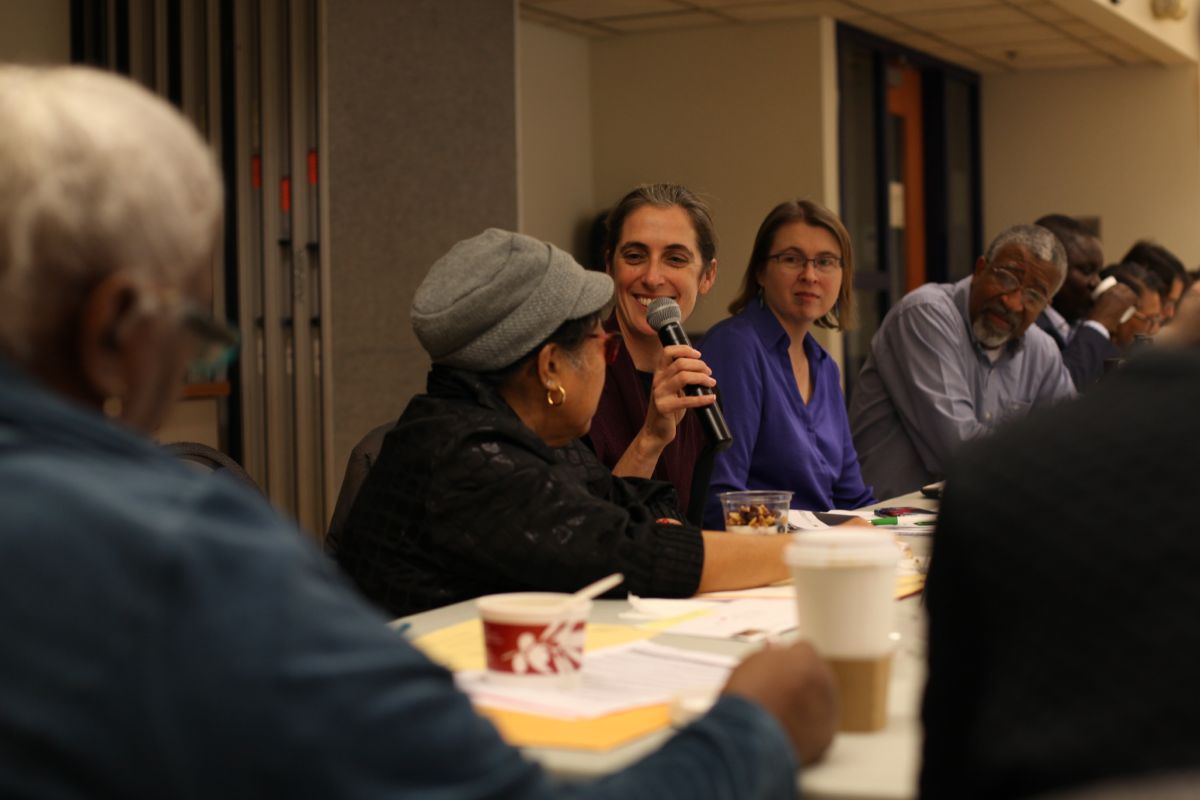
HPRC had also just received a $750,000 grant from the AARP Foundation, so Steinman wanted more skills to help lead that project. The project ended up becoming the basis of her dissertation, and had two goals: determine if PEARLS was financially advantageous and to understand the social impact. Her third dissertation paper drew on Archstone Foundation and Partnership for Health-funded projects to see how PEARLS could be adapted in under-resource, cultural contexts.
The first goal, determining if PEARLS was financially advantageous, was measured by comparing the use of costly services by PEARLS participants to use by people who did not participate in PEARLS. Using quasi-experimental methods to look at data sets from Washington state, Steinman matched PEARLS participants with those in similar demographic and living situations. Through this comparison, she found that PEARLS participants’ reduced hospitalizations and nursing home stays, which have significantly higher costs than PEARLS implementation.
Next, Steinman looked at the social impact. She found that participants in the study reduced their loneliness and social isolation and improved social interactions and satisfaction with social supports. While the study wasn’t set up in a way to determine if PEARLS or some other factor influenced these outcomes, the findings were collected at a critical moment: the U.S. Surgeon General declared loneliness an epidemic and public health crisis, citing that loneliness and social isolation are linked to heart disease, cognitive function, depression, and more. This emphasized on a national level the importance of programs like PEARLS that connect aging adults with community. Steinman found that PEARLS participants even improved their social connection during the COVID-19 pandemic.
For the third goal, Steinman compared two case studies to understand how PEARLS was delivered and adapted for two different cultural contexts than the original research – partnering with promotoras – community health workers – to support older Spanish-speaking Latinos in southern California, and social workers supporting Cambodians living with diabetes. Unpacking how PEARLS works and can be improved in limited-resource settings is important for implementation science to close the know-do gap for improving health equity.
Steinman said she is grateful for her dissertation committee and faculty mentors Snowden, Associate Professor Barbara Baquero, and Professor Bryan Weiner for supporting her in her dissertation, and her many HPRC colleagues, community partners, and fellow HSPop PhD students for helping her cross the finish line. She’s also thankful for her family for being so supportive and keeping her nourished and inspired throughout her PhD journey.
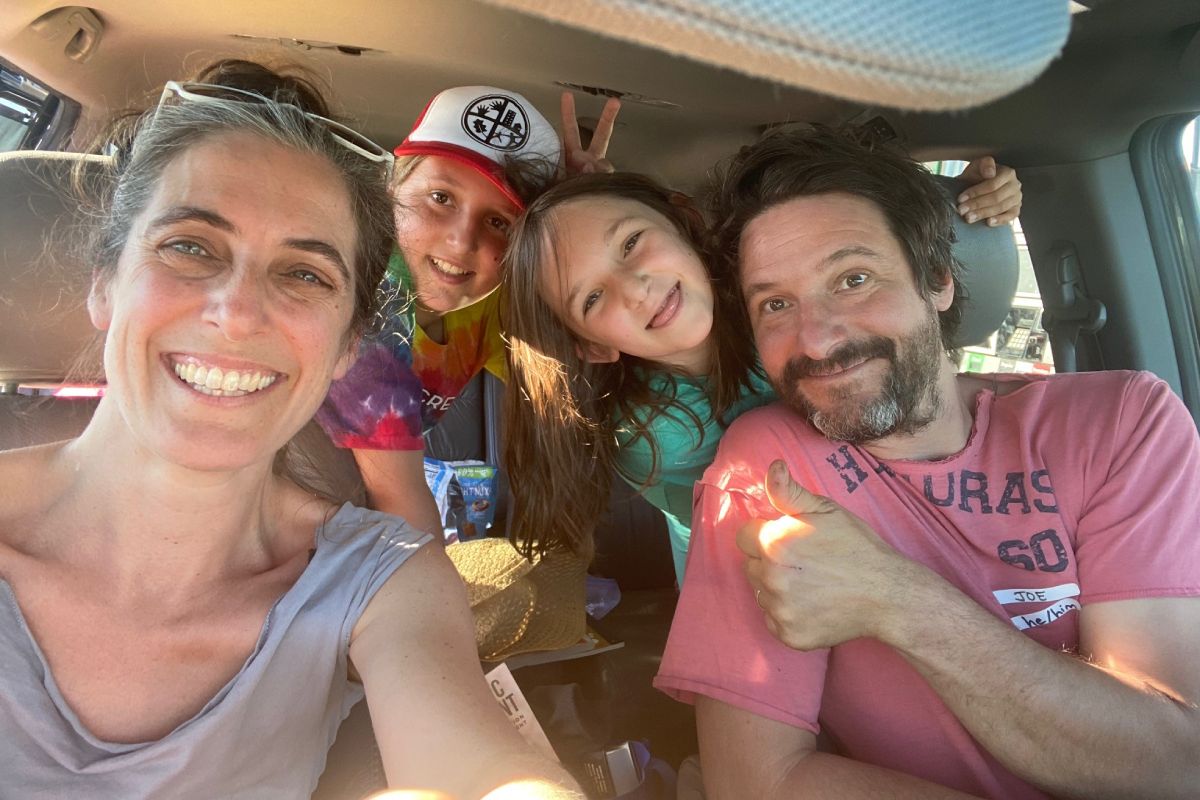
Having earned her doctorate in March, Steinman will use her degree to help scale-up an expansion of PEARLS in California. After receiving community feedback that aging adults did not have enough support, the California Mental Health Services Oversight & Accountability Commission identified PEARLS as a program it will fund with $16 million by making eight awards to organizations adopting PEARLS over the next three years. She’s looking forward to partnering with community organizations and faculty, staff, and students across SPH to scale up other mental health and social connectedness programs.
Throughout her career in higher education, Steinman is a strong advocate for the knowledge and wisdom of community members, staff within university settings, and others being valued as much as those with top-level academic degrees. She hopes to use her doctorate to continue to spread the learnings that come from those who make PEARLS a success.
“Our team is working hard to amplify all the amazing work that’s happening on the ground in community social service organizations, and calling out where more support is needed,” Steinman said. “We’re doing community-engaged research and practice so that the evidence reflects communities who have been systematically excluded. This will help future supports better align with their strengths and needs.”
Learn more about PEARLS